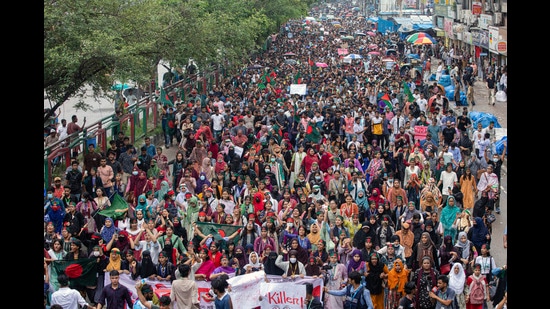Aug 12, 2024 09:26 PM IST
Sri Lanka has shown democratic intent. In the case of Bangladesh, the democratic roots are weak, and the willingness of the army to step in repeatedly, despite elected governments being in power, is perhaps the major difference between Bangladesh and Sri Lanka.
Recent events in Bangladesh — protests, violence and the ouster of an elected government — bear an eerie resemblance to what happened in Sri Lanka in 2022. However, the results of the Sri Lankan protests and subsequent actions vary from the path Bangladesh has chosen.

What are the similarities? The Sri Lankan protests, emanating from economic distress, were led by a people’s movement, the Aragalaya. This seemed spontaneous and acquired traction, including quiet support from political parties. In Bangladesh, too, economic issues related to reservation in employment lit the spark. The diminishing economic resilience of Bangladesh was part of the problem. The student-led protests were not violent. As it was in Sri Lanka, they received support from parties and groups inimical to the ruling dispensation.
In Sri Lanka, the protests turned violent when the ruling party’s youth cadres were unleashed on the protesters. Similarly, in Bangladesh, the protests turned violent when the youth wing of the ruling party started attacking the protesters. Thereafter in Sri Lanka, the protest became one against all political parties and politicians. In Bangladesh, the assault was mainly on the ruling Awami League, its supporters, and minority groups. The ransacking of the leaders’ mansions was common in both countries. And, in both cases, an elected leader fled the country.
The similarities continue. Gotabaya Rajapaksa left Colombo for Singapore, from where he sent in his resignation. After Singapore, he went to Thailand for two months. His avenues of fleeing to the West were circumscribed by allegations of human rights violations. Efforts to get him to a West Asian country were infructuous. Deposed Bangladeshi Prime Minister (PM) Sheikh Hasina’s son denies that any asylum request was made, and Hasina continues to stay in India for the moment.
After 52 days abroad, Gotabaya returned to Sri Lanka. His brother, Mahinda Rajapaksa, had gone to Trincomalee and stayed in a military base till it was safe to return. Here is where the divergence comes in. Will the situation in Bangladesh, currently unsafe for the Awami League, improve for its return as a party? Hasina’s son, who earlier said that she was “done with Bangladesh”, now says that she would like to return to Bangladesh.
The divergence is because in Sri Lanka, the military, while not firing upon the protesters, protected public property and followed government orders. In the case of Bangladesh, the military refused to fire on protesters, but failed to protect public property and hastily packed the PM off, instead of guarding an elected leader who should have perhaps been dealt with more democratically.
Before Gotabaya left Sri Lanka, he had appointed Ranil Wickremesinghe as the PM. This appointment was backed by the ruling Sri Lanka Podujana Peramuna (SLPP), though Wickremesinghe’s United National Party had just a single seat in parliament. Parliament was not dissolved, unlike in Bangladesh; it was allowed to function with a minority PM, who, upon Gotabaya’s resignation, was then elected president backed by parliament. The army and police forces took orders from him. Wickremesinghe’s popularity with parliamentarians increased because he instructed the armed forces to protect all citizens, including the politicians, and attacks on their homes and families were controlled. The military in Bangladesh has been unable to do this.
In Sri Lanka, the political process continued to function and constitutional requirements were met by the military. In Bangladesh, the military is trying to call the shots, dissolving the elected parliament and swearing in an interim government of supposedly non-political people of unverified administrative experience.
Now, they are garnering the goodwill of the interim government. The speed at which Wickremesinghe had used the functioning system of Sri Lanka to control the public outburst is yet to be seen in Dhaka.
Moreover, Wickremesinghe had the charisma to work with agencies at home and creditors abroad, particularly India, which had often been slighted by the Rajapaksas, to bail them out of a difficult economic situation. Indian assistance brought solace to the Sri Lankan people, for which they are still grateful. In the case of Bangladesh, there is a streak of anti-Indianism, cultivated by those who have infiltrated the protests.
In Sri Lanka, Wickremesinghe saw through the rest of Rajapaksa’s term, and elections are due on September 21 — remarkable for a country under economic and political siege, that used its own democratic credentials to come out of a crisis. In the case of Bangladesh, this seems a bit far-fetched. Had they let parliament function, the interim government could perhaps have got better legitimacy. Since parliament was dominated by the Awami League, the expectation now is that fresh polls will push the Awami League into oblivion, or a minority, and let hitherto suppressed forces emerge.
India is sceptical about these alternative forces, which often taken an anti-India stance. In the case of Sri Lanka, while the Rajapaksa-led SLPP followed an anti-India line, once the writing was on the wall and Wickremesinghe took over, they did not oppose his engagement with India and remained thankful for the latter’s support.
This is the irony. Sri Lanka has shown democratic intent. In the case of Bangladesh, the democratic roots are weak, and the willingness of the army to step in repeatedly, despite elected governments being in power, is perhaps the major difference between Bangladesh and Sri Lanka.
Gurjit Singh is former ambassador to Germany, Indonesia, Ethiopia, ASEAN and the African Union, and is honorary professor, IIT Indore.The views expressed are personal
Story Saved


